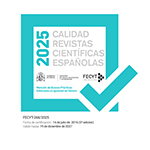From literary “revival” to political nationalism? A comparison between the Catalan and Basque-speaking territories (1850-1900)
Abstract
With a comparative perspective, this paper studies the origins of the concepts Renaixença and Pizkunde and holds two complementary theses. First, the “revivals” of the Catalan and Basque languages took place within the Spanish (and French) nation-building process. Regionalism (and its variants) is one of the possible ways of nationalization and, in the second half of the 19th century, Catalans and Basques were not the only ones who conceived of Spain as a multilingual nation. And second, the transition from cultural to political claims is the exception rather than the rule. Amongst the studied examples, only in Catalonia (and with many nuances) can some continuity be detected between “revival” and nationalism. In the other Catalan-speaking areas, local identity continues to manifest itself in provincial or regional terms, not in national terms. On the other hand, in the Basque-speaking countries, political nationalism emerged autonomously from the literary “revival” in the Basque language. In addition to industrialization and the attitude of the elites, the sociolinguistic situation in origin, the persistence (or not) of the institutions of the Ancien Régime, and the influences of similar movements in other countries are factors that have determined the history of these territories and, therefore, they should be taken into account when establishing historiographical models.
Downloads
Article download
License
Aquellos autores/as que tengan publicaciones con esta revista, aceptan los términos siguientes:
a. Los autores/as conservarán sus derechos de autor y garantizarán a la revista el derecho de primera publicación de su obra, el cuál estará simultáneamente sujeto a la Licencia de reconocimiento de Creative Commons Reconocimiento-No comercial-Sin obra derivada 4.0 España que permite a terceros compartir la obra siempre que se indique su autor y su primera publicación esta revista.
b. Los autores/as podrán adoptar otros acuerdos de licencia no exclusiva de distribución de la versión de la obra publicada (p. ej.: depositarla en un archivo telemático institucional o publicarla en un volumen monográfico) siempre que se indique la publicación inicial en esta revista.
Plagio y fraude científico
La publicación de un trabajo que atente contra los derechos de propiedad intelectual será responsabilidad de los autores/as, que serán los que asuman los conflictos que pudieran tener lugar por razones de derechos de autor. Los conflictos más importantes pueden darse por la comisión de plagios y fraudes científicos.
Se entiende por plagio:
1.Presentar el trabajo ajeno como propio.
2.Adoptar palabras o ideas de otros autores sin el debido reconocimiento.
3.No emplear las comillas u otro formato distintivo en una cita literal.
4.Dar información incorrecta sobre la verdadera fuente de una cita.
5.El parafraseo de una fuente sin mencionar la fuente.
6.El parafraseo abusivo, incluso si se menciona la fuente.
Las prácticas constitutivas de fraude científico son las siguientes:
1.Fabricación, falsificación u omisión de datos y plagio.
2.Publicación duplicada.
3.Conflictos de autoría.












